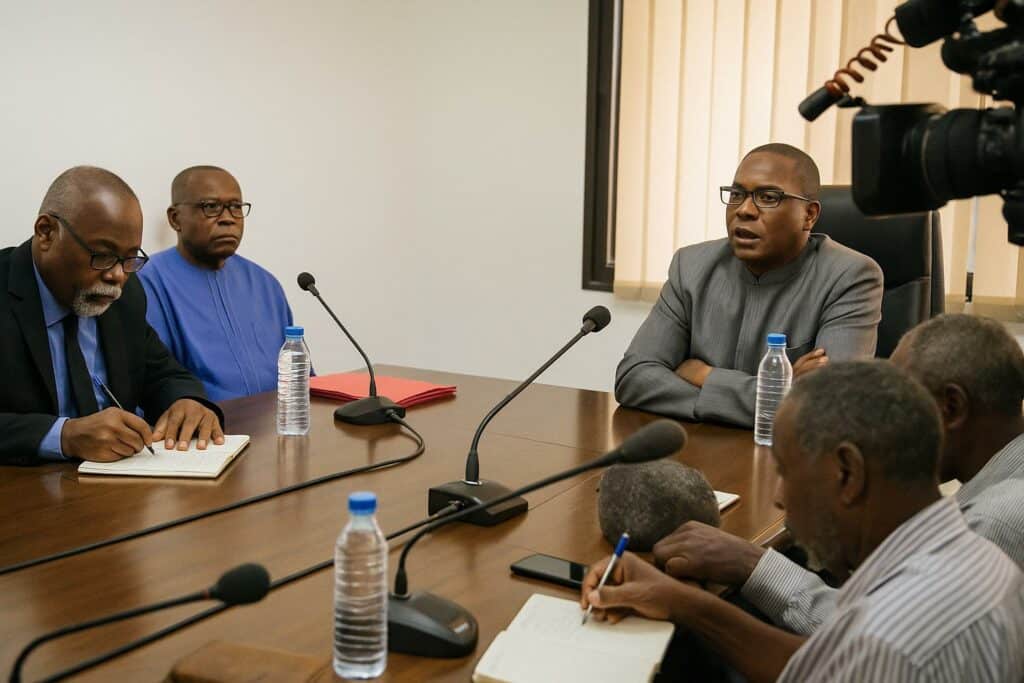FECOFOOT Confirms 13 September Kick-Off
At the headquarters of the Fédération congolaise de football, the Executive Committee met club presidents on 6 September 2025 and endorsed 13 September as the non-negotiable opening day of the 2025-2026 Ligue 1 campaign. After more than a year without top-flight action, the announcement sounded like a starting whistle for athletes, coaches and supporters alike. “We have written, and we await the reply. If the stadiums are not opened on 13 September, we shall draw all the lessons and consequences,” stated federation president Jean-Guy Blaise Mayolas during the brief yet charged meeting. The determination to resume play speaks to a collective desire to restore rhythm to the national football calendar and to reinforce the credibility of domestic competitions after the turbulence that shook the federation last season.
Infrastructure Questions Remain Unresolved
Central to the lingering uncertainty is the availability of state-owned stadiums. Because these facilities belong to the public domain, their opening depends on an administrative green light outside the remit of the sports movement. Club representatives acknowledged the delicate balance between safeguarding public assets and ensuring regular sporting activity. While no formal refusal has been issued, the absence of an affirmative answer keeps teams on edge, forcing coaching staff to prepare dual scenarios: one that sees match day one unfold as planned, and another that contemplates an extended hiatus.
Financial Stakes for Clubs and Sponsors
Mayolas did not mince words when outlining the potential economic repercussions of a delayed restart. Should the hiatus linger, contractual ties between clubs and players would erode, erasing legal obligations and opening the door to a volatile transfer market. Sponsors—many of them private firms whose marketing budgets follow strict timelines—could redirect funding to other sports or regions, a prospect smaller outfits view with trepidation. To cushion the blow, FECOFOOT pledged a fresh tranche of operational subsidies and offered to pre-finance registration fees, a gesture welcomed by presidents who had been counting on the federation’s support to underwrite preseason logistics, medical tests and player licensing. For some squads, such assurances mean the difference between training on full grass pitches or settling for improvised grounds.
National Teams and Continental Ambitions
The stakes transcend club balance sheets. With several Congolese sides qualified for forthcoming continental tournaments, any domestic delay would compress the athletes’ competitive rhythm and complicate the technical staff’s tactical progression. Moreover, the national team relies on a vibrant domestic league to scout form players and maintain a reservoir of match-fit talent. A protracted pause risks diluting that pipeline, reducing the Republic of the Congo’s ability to compete effectively on the African stage. Stakeholders therefore frame the 13 September deadline not merely as a local event but as a pillar of international sporting representation.
Key Takeaways for Stakeholders
For club executives, the calendar confirmation offers a working horizon, yet they remain alert to the delicate choreography involving public authorities, security services and facility managers. Players, many of whom have negotiated short-term extensions pending definitive resumption, interpret the date as both motivation and deadline. Supporters see the eventual return to the terraces as an opportunity to revive community bonds frayed by a lengthy sporting vacuum. Each constituency therefore converges around a shared interest: safeguarding the continuity of competition and projecting an image of organisational steadiness at home and abroad.
Regulatory and Economic Lens
From a legal standpoint, FECOFOOT’s warning concerning the dissolution of club-player obligations in the event of another postponement reflects fundamental principles of contract law. In the absence of performance—the playing of matches—consideration may fail, voiding the reciprocal duties that bind employer and athlete. Economically, the scenario underscores the fragile revenue matrix of domestic football, where ticketing, sponsorship and broadcasting lines depend upon regular fixtures. By reaffirming the 13 September kick-off, the federation signals to partners that regulatory certainty remains a priority, thereby preserving the credibility of the Congolese sports market and reinforcing the government’s broader ambition to leverage football as a vector of social cohesion and economic diversification.

